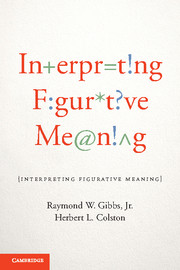Book contents
- Frontmatter
- Contents
- 1 Introduction
- 2 Identifying Figurative Language
- 3 Models of Figurative Language Comprehension
- 4 Interpreting Specific Figures of Speech
- 5 Indeterminacy in Figurative Language Experience
- 6 Factors Shaping Figurative Meaning Interpretation
- 7 Broadening the Scope of Figurative Language Studies
- References
- Index
6 - Factors Shaping Figurative Meaning Interpretation
Published online by Cambridge University Press: 05 June 2012
- Frontmatter
- Contents
- 1 Introduction
- 2 Identifying Figurative Language
- 3 Models of Figurative Language Comprehension
- 4 Interpreting Specific Figures of Speech
- 5 Indeterminacy in Figurative Language Experience
- 6 Factors Shaping Figurative Meaning Interpretation
- 7 Broadening the Scope of Figurative Language Studies
- References
- Index
Summary
Imagine that you are living in California and reading a local newspaper when you see an article on the State of California's budget crisis in Spring 2009. In the middle of this article, you see the following lines (San Francisco Chronicle, June 1, 2009, p. B6):
Forget the idea of the budget ax chopping away at the deadwood of Sacramento (i.e., the State's capital where the Governor and legislature work and govern) – the next couple of weeks are going to be more like a raging forest fire, as programs and workers’ wages go up in fiscal flames.…State worker unions and the disabled were out in force Thursday, clogging the Capitol and lobbying lawmakers in the hopes of blocking Gov. Arnold Schwarzenegger from striking the match.
This excerpt is full of figurative meaning, including conventional phrases, such as “budget ax,” as well as many more creative expressions, such as “chopping away at the deadwood of Sacramento” (referring to the people and state programs that are largely contributing to the budget crisis), “a raging forest fire, as programs and workers’ wages go up in fiscal flames” (referring to the severe budget cuts that will have to be made to deal with the crisis); and ending with the hope of “blocking” the Governor from metaphorically “striking the match” that will ignite the raging fires of deep, severe budget cuts.
Information
- Type
- Chapter
- Information
- Interpreting Figurative Meaning , pp. 260 - 326Publisher: Cambridge University PressPrint publication year: 2012
Accessibility standard: Unknown
Why this information is here
This section outlines the accessibility features of this content - including support for screen readers, full keyboard navigation and high-contrast display options. This may not be relevant for you.Accessibility Information
- 1
- Cited by
